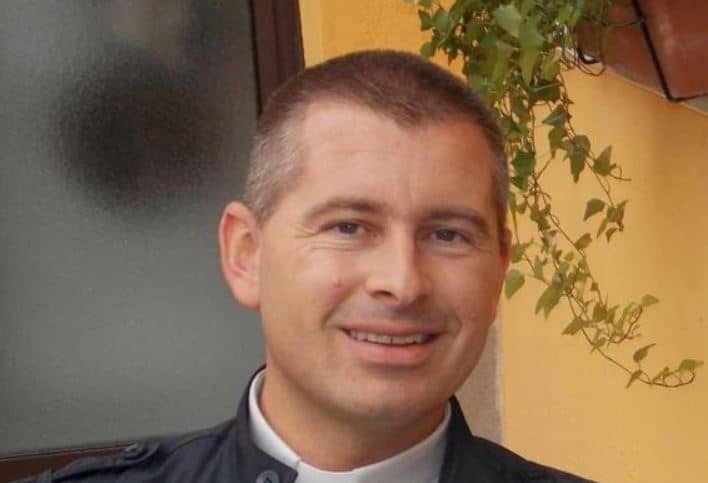DUBLIN – Doctrinal rigidity, according to the head of the powerful Italian bishops’ conference, can’t be the driving force in the Church any longer, but rather accompaniment of people and flexibility in pastoral judgment.
“The Church is a home with the door always open,” said Cardinal Gualtiero Bassetti of Perugia, Italy, during a panel titled “Accompanying, Discerning and Integrating: Human Fragility and Amoris Laetitia,” Aug. 24.
His talk focused on understanding the ideas underlying Pope Francis’s 2016 apostolic exhortation on family life and relationships, Amoris Laetitia. While Church doctrine is unchangeable, the cardinal said, it takes into account the individual situations of every family and relationship, even those that did not exist in the past.
“Not every irregularity is a mortal sin,” Bassetti said. “If we consider everything to be a mortal sin, then we exclude any form of integration. Once we acknowledge that not every disorderly act is a mortal sin, then there is opportunity for discernment.”
The head of the Italian episcopal conference began his talk by referencing the Holy Ring of Perugia, kept in the cathedral of the city since 1488 and exposed to the faithful twice a year, which, according to popular belief, was the wedding ring of Mary and Joseph.
The ring represents the sacred purpose and role of marriage in the Catholic faith and a model for all couples wishing to join in the sacrament, Bassetti said.
“The family is a love that saves and will save the world,” is what he wrote in a letter to Pope Francis as well as using it as a motto throughout his speech. Yet, he added, in his document Amoris Laetitia Francis casts a “paternal gaze” over families while not giving up “the full ideal of matrimony.”
“We, the Church, must look at families with the eyes of the Good Samaritan,” Bassetti said, not just walking past those who stray or falter, but bending down and leading them toward the Church.
The pope’s invitation to accompany, discern and integrate lays down a path that allows the Christian community “to express the full dynamism of the Gospel,” he added.
“We often repeat: ‘The Holy Mother Church,’ but often it’s rhetoric,” Bassetti said. “The Church must be a mother in reality also.”
As secularizing forces undercut the importance of marriage and family life, the cardinal said, the sense of disorientation is even greater, making the Church’s role of accompaniment and solidarity ever more important.
Borrowing from Francis’s preferred analogy of the Church as “a field hospital,” Bassetti suggested that Catholicism must “embrace the medicine of mercy instead of taking up the arms of rigidity.”
Referring to the specific case of Italy, currently undergoing financial woes and political instability under its populist left and right-wing coalition government, Bassetti repeated his invitation to take on “the art of mending back together.”
“Italy is a fragile land as are the people who inhabit it, and it needs to be sown back together and mended,” he said. “The case of Genoa is a full demonstration.”
The cardinal had already expressed his “sorrow and solidarity” concerning the fatal bridge collapse in Genoa, in northern Italy, which caused the death of over 30 people including three children and made headlines worldwide.
Just as countries and bridges are fragile, so are people and families, Bassetti said. He condemned the general impression that those who married in the Church and then separated – “perhaps without thinking about it enough” – are not included in Christ’s project for forgiveness, joy and grace.
When asked directly by attendees at the summit of families about “the red line” of allowing communion for the divorced and civilly remarried, cautiously considered in Amoris, Bassetti emphasized the importance of discernment.
There’s a fine line, he answered, between “laxity” and “rigorism.” The first leads to priests saying that anything is admissible and the second refuses any form of dialogue. “Both are against mercy, and therefore against the Gospel,” he said.
“The Church walks and addresses with realism what happens in the world and in its ministry,” the cardinal said, adding that the wide disparity of attitudes encountered in different parishes urges the Church to “get a move on.”
The risk that lies behind these attitudes is indifference, the cardinal said, adding that in the same way many baptized Catholics abandoned the Church, the Church has abandoned its brothers and sisters. Bassetti offered some advice about how to accompany couples and individuals without adopting the “wrong behavior.”
Sometimes instead of accompanying, people tend to act as guides, he said, dragging people toward the Church or pushing it ahead. But accompanying means to stand alongside the other, he continued, and walking together.
Another mistake is that of acting like “the older brother,” Bassetti said, who believes he knows everything and has all the principles clear. “This can really drive a lot of couples away,” he warned.
It’s important to avoid “pre-made recipes” and make sure that situations are assessed individually, the cardinal concluded. “We are called to form consciences, not to expect to substitute them.”

















